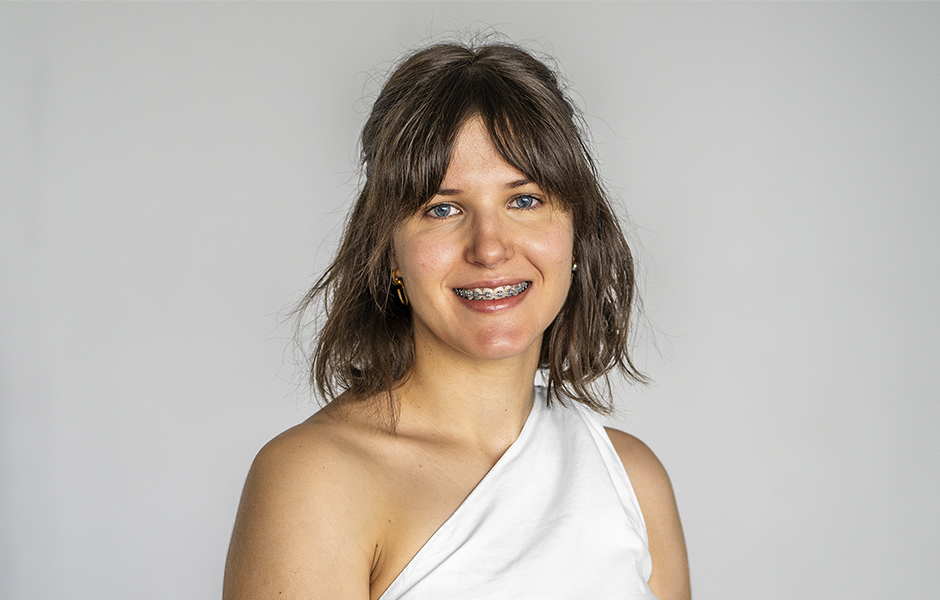Bárbara Caetano da Mota is the researcher at CINTESIS – Center for Health Technology and Services Research who has been in the news for winning the Pepe Scholarship, awarded by the former Portuguese national soccer team player, at the initiative of the Associate Laboratory RISE, based at the Faculty of Medicine of the University of Porto (FMUP). Curious and “fascinated by the human body”, the 28-year-old scientist has focused her research on the brain and dreams of contributing to a society with a better quality of life.
She was born on July 13, 1996, in Viseu but her origins are in Aguiar da Beira in the district of Guarda. “When I was a child, I was already extremely curious about the human body and how it works. Although I didn’t know what it meant to be a scientist, I felt I was on my way there,” he says.
She graduated in Biology from the University of Aveiro in 2015 and completed her master’s degree in Neurobiology at FMUP in 2020. “As I’ve always been fascinated by the workings of the human body, I thought that a degree in Biology would be the best path for my future. However, it was only when I had the opportunity to do a curricular internship at FMUP that I discovered my true interest in neuroscience and research,” she stresses.
In 2021, she began working as a research fellow on the HEALTH-UNORTE project, funded by NORTE2020 and Portugal2020, and in September of this year, she started her PhD in Neuroscience at FMUP. At CINTESIS, she is a member of the NeuroGen research group, dedicated to studying the effect of nutrition on the hippocampus, a region of the brain that is fundamental to cognition, memory and learning.
The results of his studies have generated interest and media coverage. This was the case, for example, with the article he published back in 2024 in the International Journal of Molecular Sciences. This research carried out on animal models, made it possible to analyze the molecular mechanisms that may explain the effects of chronic consumption of diets rich in fat and sugar on the developing brain.
The conclusions indicate that “the cognitive and anxiety problems associated with the consumption of high-calorie diets may be related to an increase in neuro-inflammation and/or a reduction in neurogenesis and the expression of certain proteins of the GABAergic system in the formation of the hippocampus”.
According to the researcher, some neurons in the hippocampus are particularly vulnerable to high-calorie diets, at least during adolescence, which could explain problems with spatial learning and memory, as well as increased levels of anxiety.
“At the moment, my work is basically aimed at reversing the deleterious effects that the consumption of high-calorie diets has on hippocampal neurons, using not only natural polyphenols, but also drugs that are typically used as first-line treatment for type 2 diabetes mellitus ,” he explains.
On the basis of her work, she was awarded a health research grant, the Pepe Scholarship. The award, worth 18,000 euros, was presented to her as part of RISE Day 2024, which took place on October 23 at the Portuguese Oncology Institute (IPO) in Porto.
The CINTESIS@RISE/FMUP researcher reacted with “surprise, joy and pride” to being awarded the Pepe Scholarship, saying that the initiative “will have a significant impact” on her research project.
What’s your 1-year ambition (in terms of research)?
In a year’s time, I hope to have published results under the Pepe Grant.
What’s your 10-year ambition?
In 10 years’ time, I’d like to have my own sustainable line of research in the area to which I’ve dedicated the last few years, making a positive contribution to society’s quality of life.
What do you like to do in your spare time?
In my free time, I like to be surrounded by family and friends. Good conversation and good company are always the best way to relax and take my mind off work. My hobbies are varied; I like to read a good book, watch a movie or a series, or just enjoy resting and catching up on sleep.

